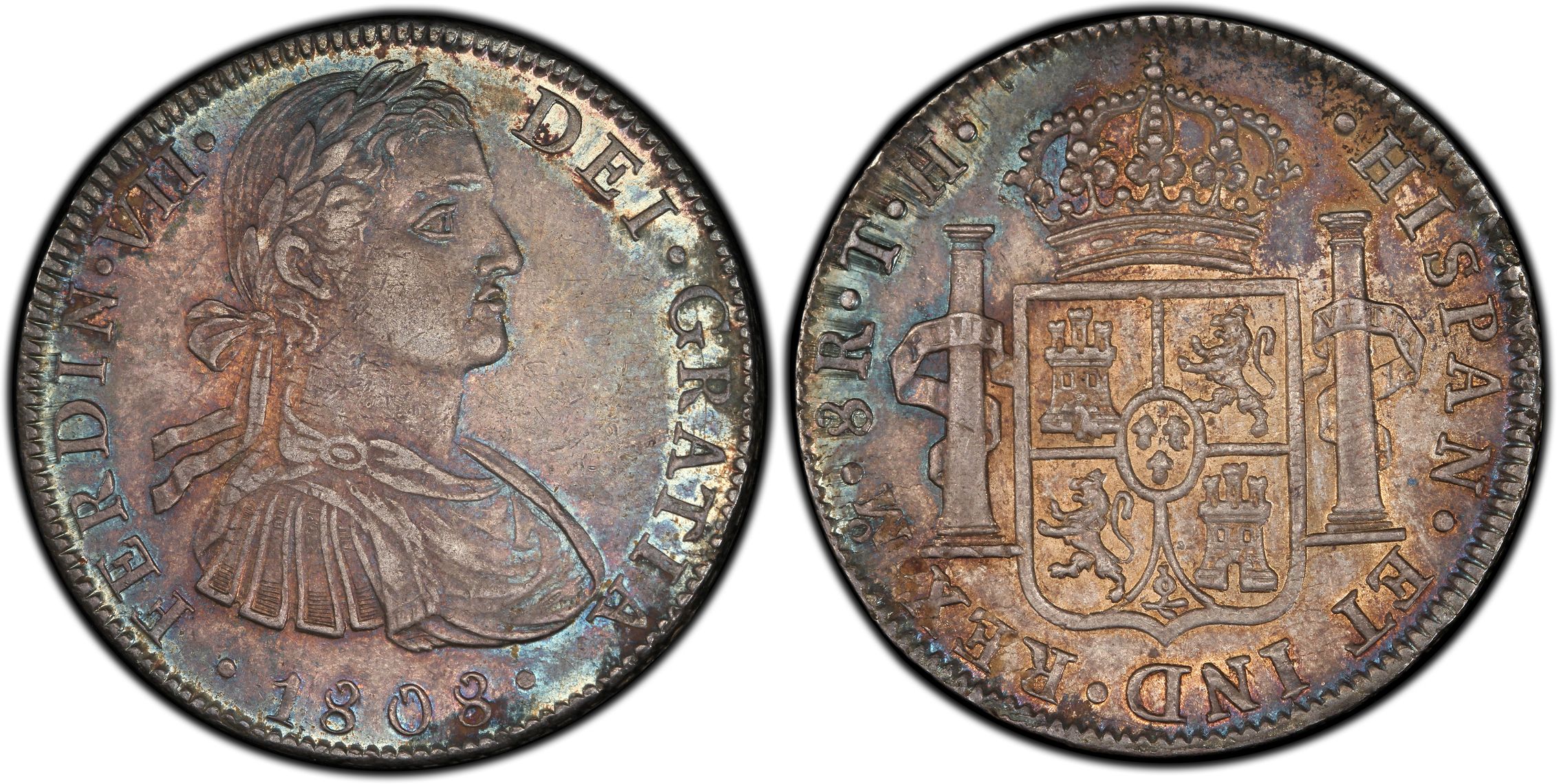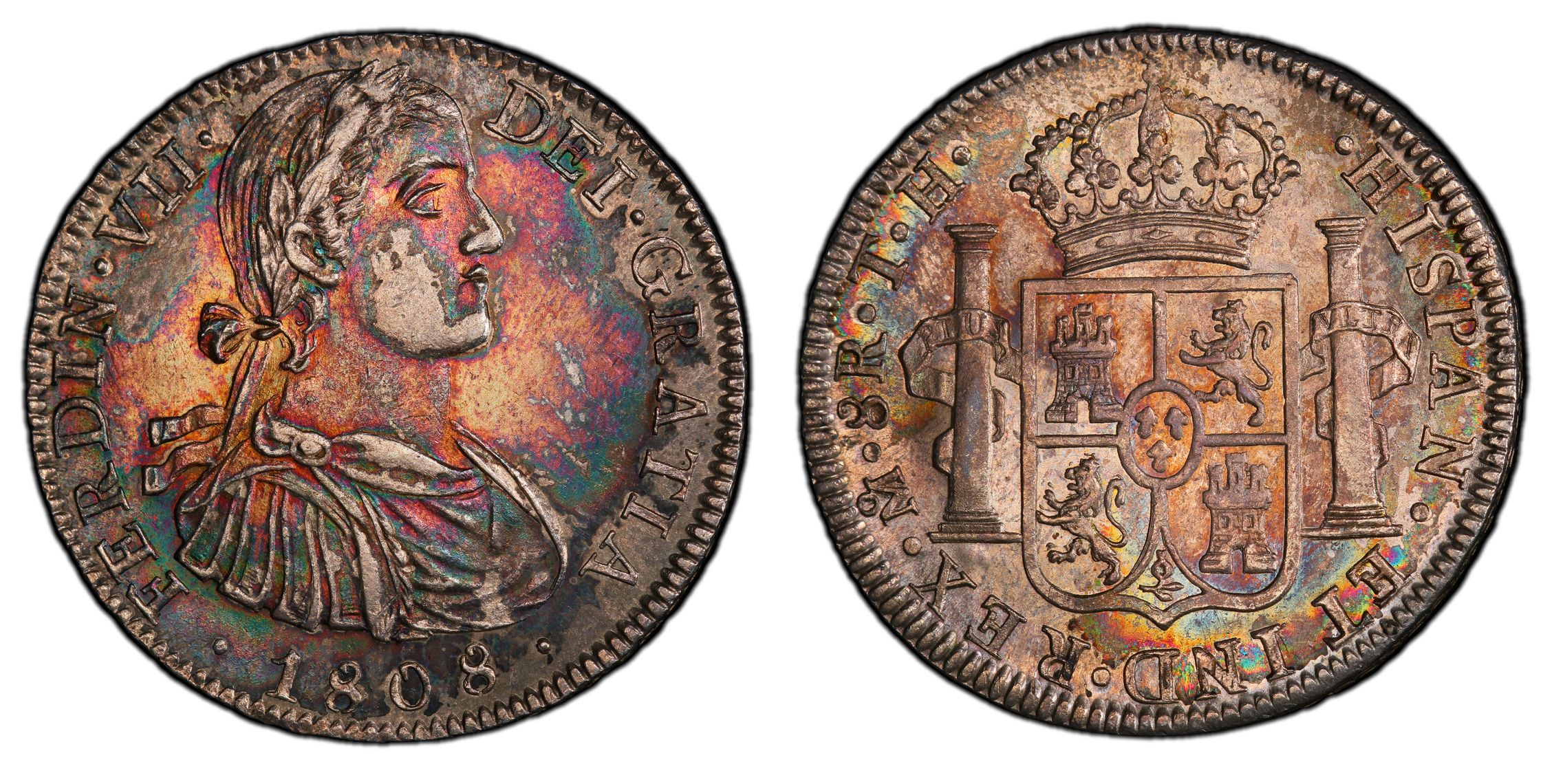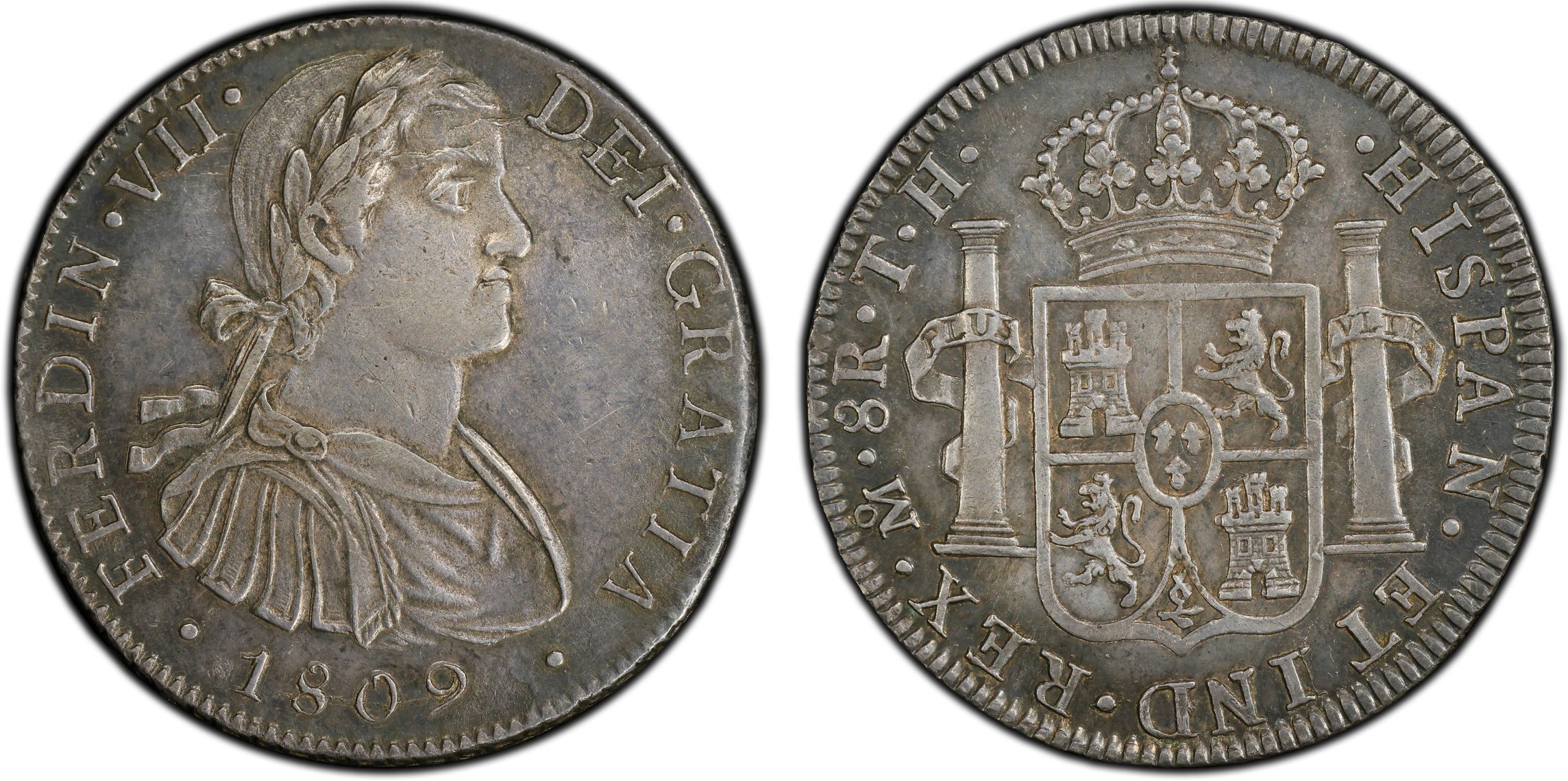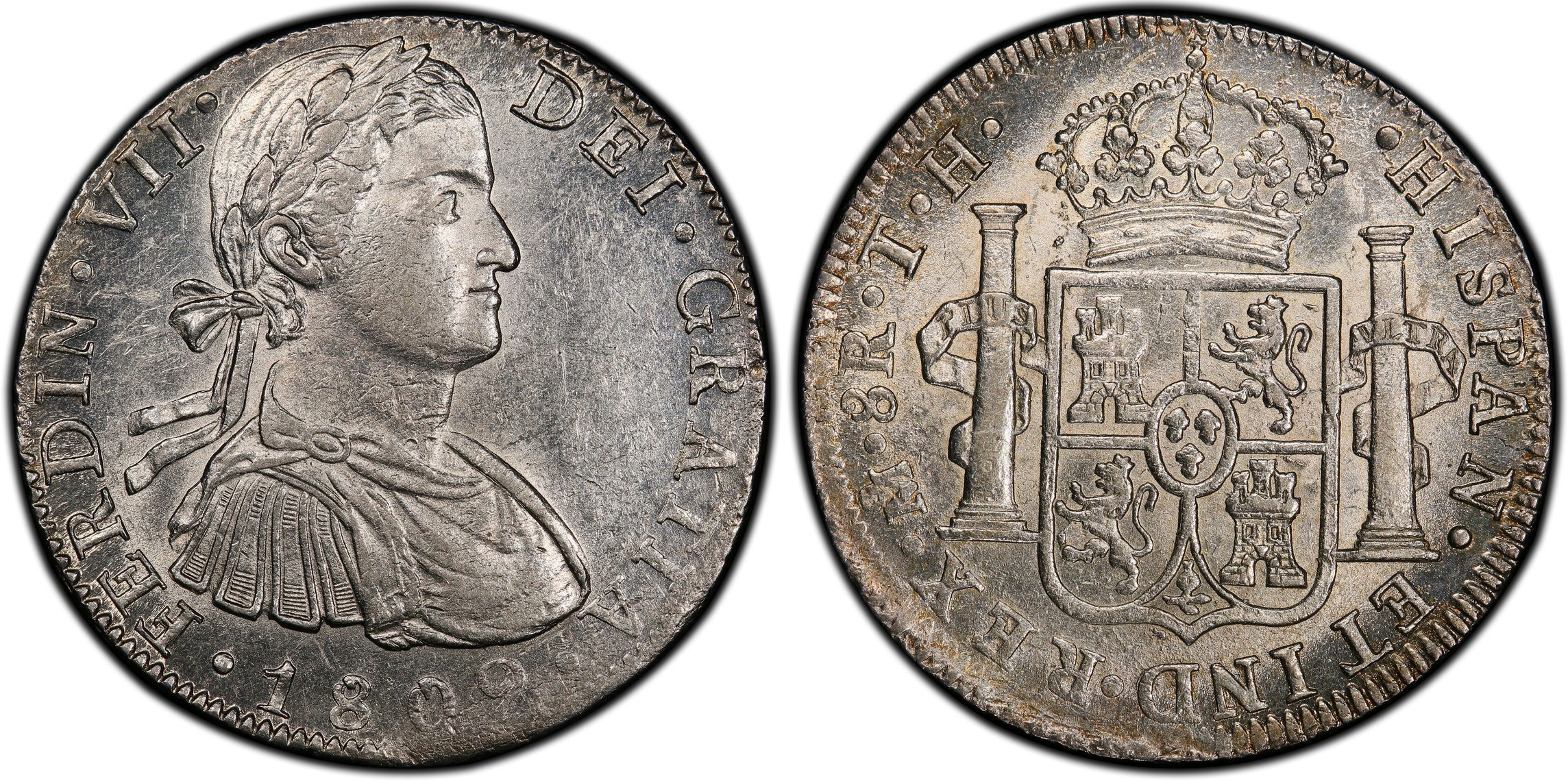@pruebas said: @JohnnyCache sorry to resurrect your 1.5 year old comment, but it had stuck in my mind and the thought resurfaced in yesterday's EMO Collection sale at Stacks.
I managed to obtain a common Zacatecas cuartilla (1825) in a very uncommon grade--NGC MS63. I also snagged the silver presentation specimen of the same date--NGC MS61. This is the now earliest-dated silver cuartilla/octavo in my collection.
The MS63 regular issue sold over $5000, so you can see the rarity/demand/"unusuality" of such a coin.
I saw those in the Stacks auction. Though I lusted after the silver piece I knew from the onset it was just a pipe dream for me however I actually pursued the 63, though ultimately I had to bow out well shy of the final hammer.
They are stunning examples, congratulations!
I thought your comment in the other thread was interesting:
@pruebas said:
I don’t believe that piece is a Soho Mint product.
One of these days I’ll write an article refuting that erroneous conclusion in the book that claimed it is.
But I bought that lot. Ugh!
Is it your belief that it is none the less still a pattern piece albeit perhaps not a Soho Mint product or is there something else at work here?
Having seen and owned many Soho Mint pieces over the years, and having read books and papers on the subject, I have a pretty good feel for what their products look and feel like. I am convinced that these 1838 so-called fantasy patterns (and I'm not sure fantasy is the correct word either) are not Soho.
The workmanship, the edge, the "fabric", the material. They just don't "feel" like Soho products.
Stacks got the attribution from a recent book by a Mexican author. Notice NGC did not use that attribution on the slab. I corresponded with the author before he wrote the book, but he was dead set on his theory. He has absolutely no primary sources, did not see any Soho archival material, did not see the actual coins, and has little numismatic experience. He just put out that conjecture, wrote a book, found a publisher, and (most) everyone believed him.
I think the pieces came from Europe. but not Soho and probably not the UK.
As to whether they are patterns. Not in the traditional sense. Maybe more like the 1890 Lauer 2c pieces. Like advertising pieces or something like that. But they are very rare (hence why I paid up for that example).
@pruebas said: @JohnnyCache sorry to resurrect your 1.5 year old comment, but it had stuck in my mind and the thought resurfaced in yesterday's EMO Collection sale at Stacks.
I managed to obtain a common Zacatecas cuartilla (1825) in a very uncommon grade--NGC MS63. I also snagged the silver presentation specimen of the same date--NGC MS61. This is the now earliest-dated silver cuartilla/octavo in my collection.
The MS63 regular issue sold over $5000, so you can see the rarity/demand/"unusuality" of such a coin.
I saw those in the Stacks auction. Though I lusted after the silver piece I knew from the onset it was just a pipe dream for me however I actually pursued the 63, though ultimately I had to bow out well shy of the final hammer.
They are stunning examples, congratulations!
Thank you.
Did you win any of the other mint state cuartillas?
@pruebas said:
Did you win any of the other mint state cuartillas?
What did you think of the 1824 Zacatecas?
I didn't end up bidding on any other pieces. I tracked and momentarily thought about the 1862 Zacatecas in NGC AU-50, but it's hard to fall in love with the bride ( the 1825 Zacatecas NGC MS-63) and instead come home with a less attractive bridesmaid (1862 Zacatecas NGC AU-50).
Oh my goodness, I hadn't tracked the 1824 Zacatecas, as when I originally looked at the lots I didn't like the look of the crack so I had to look it up now, wow I'm in shock.
I never would have imagined that hammer price. That said, I have limited numismatic knowledge and I am simply attracted to this design for the beauty of it. Is there something, beyond grade that elevated that piece to that lofty hammer price?
@pruebas said:
Did you win any of the other mint state cuartillas?
What did you think of the 1824 Zacatecas?
I didn't end up bidding on any other pieces. I tracked and momentarily thought about the 1862 Zacatecas in NGC AU-50, but it's hard to fall in love with the bride ( the 1825 Zacatecas NGC MS-63) and instead come home with a less attractive bridesmaid (1862 Zacatecas NGC AU-50).
@bidask knows all about marrying the bridesmaid instead of the bride!
And I get it. I feel the same way.
Better to pay up on the coin that tugs your heart, else you’ll be thinking about it every time you view the substitute.
My only addition from the Paul Rutherford sale is below. This is the only known 1803 with assayers FM that has ever been considered genuine. I'll post a more detailed article about it after I get a chance to do some XRF testing in late October.
Grotty but perhaps still the top pop for this unlisted Yonaka/Gilboy variety of a “Three Errors Obverse” 1759 Guatemala 2 Reales.
Yonaka cataloged a G2-59c with a “reversed” (or upside down) D on the obverse and with inverted letters N (serif on lower right rather than upper left) in IND (obverse) and in VNUM (reverse). This coin shows only the inverted N on the obverse.
The Yonaka G2-59a shows an inverted A (ꓯ) substituting for V on the reverse, while this shows that substitution on the obverse (“FERD ꓯI”) instead.
Gilboy recognized three varieties without mention of the reversed D.
Redbook readers are aware of the famous 1801 Sheldon S-218 large cent known as the “Three Errors Reverse;” this is the Spanish colonial equivalent, a “Three Errors Obverse” with inverted A, D, and N.
I have been looking for this obverse for a long time and finally found it; was prepared to settle for a beautiful errorless Ex Norweb specimen of a 1759 G P 2R at Sedwick last year but passed and regret it… if that specimen needs a new home and you know where it went, let me know!
It is almost Thursday so here I go. This is as rare as they come, with 2 coins graded between both services. To be fair, I think this is an F/R oveassayer, in fact I think all the issues are F/R and if that is the case, instead of 2, there are 3 coins graded...
I am a bit surprised on how few coins I have bought this year...
@Abuelo said: @pruebas yes, not in the mood to buy a coin for the price of my house.
@Abuelo I don't think they will be coming down much or at all. The increase is mostly due to the devaluation of the USD (aka inflation). And as you know from the grocery store, once things inflate, they don't deflate.
So if you want to continue collecting (Mexican) coins, you will need to adjust to the new reality at some point.
This is an extreme rarity, and is a pattern for the proof 1983 (FM) 1/4 Balboa. This was unknown and unrecorded, when all of the sudden it popped up on ebay some 8 or so years ago. Can you spot what makes it special?
Love that Milled British (1830-1960) Well, just Love coins, period.
Without doing any research, I will take a stab at your question- the 1983 1/4 balboa likely was likely clad- even ones in the sets. So I question why the LEY 0.500 would be present on a smaller denomination coin- that’s all I got.
Nice coins.
The British Honduras penny looks quite attractive-congrats.
Experience the World through Numismatics...it's more than you can imagine.
Indeed, the 1983 Panama 1/4 Balboa is a pattern with the major difference the “Ley 0.500” designation.
Note that the more famous “Ley” varieties are the 1982 1 and 5 Balboa types. This would exceed their rarity by a bit.
No FM 1/4 Balboas were ever struck in silver. May have been a pattern for a putative 80th Anniversary of independence that never materialized.
The BH 1913 cent was quite a coup and glad to have it, a Central American rarity in top condition.
Love that Milled British (1830-1960) Well, just Love coins, period.
I recently found this in circulation in Florida. It is my oldest silver coin ever recovered.
God bless all who believe in him. Do unto others what you expect to be done to you. Dubbed a "Committee Secret Agent" by @mr1931S on 7/23/24. Founding member of CU Anti-Troll League since 9/24/24.
Not guilty here! I actually have the reverse die also & some show what appear to be gold residual that I would like to test one day - maybe XRF but none around here....
Love that Milled British (1830-1960) Well, just Love coins, period.
A couple of additional purchases from Phil Rutherford's collection being auctioned by Stacks:
1777/6 in PCGS AU Details plastic. Tough (R2) variety and surprisingly not attributed by either PCGS or correctly noted in the lot description by Stacks. A nice addition to the chopped VF details example of this die pairing already in the collection previously courtesy of Kent at World Numismatics.
And a nice original PCGS AU53 example of an 1809-TH 8 Reales with the second, less common, bust shape of Ferdinand VII.
Had these two properly attributed by NGC. 1815-JJ/HJ is now the top pop for this variety across both services and 1795/6 (as NGC called it, could be still 5/retrograde 5) is the only one certified.
Quite liking these Photo Vision images. Nice job Doug and the team!
A pick up from the recent Stack’s sale. This is the top pop for the year/type and matches my 8R milled 1770. Also seems to have an extra “7” in the date, I don’t know if that’s anything special, but I thought it was cool.
@7Jaguars said:
This is an extreme rarity, and is a pattern for the proof 1983 (FM) 1/4 Balboa. This was unknown and unrecorded, when all of the sudden it popped up on ebay some 8 or so years ago. Can you spot what makes it special?
@7Jaguars said:
That is an honest and "real" coin there Sir!
Well, not the coin, but is a die for the obverse of a 1/4 Balboa:
Franklin Mint die?
@7Jaguars said:
No, US Mint die that I believe was used to strike many of the 1982 "error" coins that were over struck on US coins and many other variants.
.
That pattern coin is Franklin Mint product. It has the Flying-F ("FM") mint mark just above the "1983" date.
The die might be a US Mint die, but I would need to see a side view of it.
Comments
Having seen and owned many Soho Mint pieces over the years, and having read books and papers on the subject, I have a pretty good feel for what their products look and feel like. I am convinced that these 1838 so-called fantasy patterns (and I'm not sure fantasy is the correct word either) are not Soho.
The workmanship, the edge, the "fabric", the material. They just don't "feel" like Soho products.
Stacks got the attribution from a recent book by a Mexican author. Notice NGC did not use that attribution on the slab. I corresponded with the author before he wrote the book, but he was dead set on his theory. He has absolutely no primary sources, did not see any Soho archival material, did not see the actual coins, and has little numismatic experience. He just put out that conjecture, wrote a book, found a publisher, and (most) everyone believed him.
I think the pieces came from Europe. but not Soho and probably not the UK.
As to whether they are patterns. Not in the traditional sense. Maybe more like the 1890 Lauer 2c pieces. Like advertising pieces or something like that. But they are very rare (hence why I paid up for that example).
Pictures are not available yet- could be interesting
Experience the World through Numismatics...it's more than you can imagine.
Thank you.
Did you win any of the other mint state cuartillas?
What did you think of the 1824 Zacatecas?
I didn't end up bidding on any other pieces. I tracked and momentarily thought about the 1862 Zacatecas in NGC AU-50, but it's hard to fall in love with the bride ( the 1825 Zacatecas NGC MS-63) and instead come home with a less attractive bridesmaid (1862 Zacatecas NGC AU-50).
Oh my goodness, I hadn't tracked the 1824 Zacatecas, as when I originally looked at the lots I didn't like the look of the crack so I had to look it up now, wow I'm in shock.
I never would have imagined that hammer price. That said, I have limited numismatic knowledge and I am simply attracted to this design for the beauty of it. Is there something, beyond grade that elevated that piece to that lofty hammer price?
@bidask knows all about marrying the bridesmaid instead of the bride!
And I get it. I feel the same way.
Better to pay up on the coin that tugs your heart, else you’ll be thinking about it every time you view the substitute.
My only addition from the Paul Rutherford sale is below. This is the only known 1803 with assayers FM that has ever been considered genuine. I'll post a more detailed article about it after I get a chance to do some XRF testing in late October.
@TwoKopeiki impressive
Happy Thursday.
Grotty but perhaps still the top pop for this unlisted Yonaka/Gilboy variety of a “Three Errors Obverse” 1759 Guatemala 2 Reales.
Yonaka cataloged a G2-59c with a “reversed” (or upside down) D on the obverse and with inverted letters N (serif on lower right rather than upper left) in IND (obverse) and in VNUM (reverse). This coin shows only the inverted N on the obverse.
The Yonaka G2-59a shows an inverted A (ꓯ) substituting for V on the reverse, while this shows that substitution on the obverse (“FERD ꓯI”) instead.
Gilboy recognized three varieties without mention of the reversed D.
Redbook readers are aware of the famous 1801 Sheldon S-218 large cent known as the “Three Errors Reverse;” this is the Spanish colonial equivalent, a “Three Errors Obverse” with inverted A, D, and N.
I have been looking for this obverse for a long time and finally found it; was prepared to settle for a beautiful errorless Ex Norweb specimen of a 1759 G P 2R at Sedwick last year but passed and regret it… if that specimen needs a new home and you know where it went, let me know!
@Plus00Vltra
So you're the one...😁
Nice pull
I'm BACK!!! Used to be Billet7 on the old forum.
Great find @Plus00Vltra My kind of coin!
My kind of coin!
Thanks @SimonW for falling on your sword and letting this one go! I am pleased as punch to have it in my collection.
New an improved images of this 66+ peso.
Latin American Collection
I like it
The date as well .
I give away money. I collect money.
I don’t love money . I do love the Lord God.
1885/4, not the common dated 1884 thankfully
Latin American Collection
It is almost Thursday so here I go. This is as rare as they come, with 2 coins graded between both services. To be fair, I think this is an F/R oveassayer, in fact I think all the issues are F/R and if that is the case, instead of 2, there are 3 coins graded...
I am a bit surprised on how few coins I have bought this year...
There certainly has been no shortage of things to buy this year. But the prices….
@pruebas yes, not in the mood to buy a coin for the price of my house.
@Abuelo Nice F25 25C

I saw this, but raw;
@Abuelo I don't think they will be coming down much or at all. The increase is mostly due to the devaluation of the USD (aka inflation). And as you know from the grocery store, once things inflate, they don't deflate.
So if you want to continue collecting (Mexican) coins, you will need to adjust to the new reality at some point.
@pruebas
This is an extreme rarity, and is a pattern for the proof 1983 (FM) 1/4 Balboa. This was unknown and unrecorded, when all of the sudden it popped up on ebay some 8 or so years ago. Can you spot what makes it special?
Well, just Love coins, period.
@ELuis and the amazing thing is how inexpensive it is. Thanks
Fam. It took a while to upgrade this, most certainly.
Well, just Love coins, period.
@7Jaguars
Without doing any research, I will take a stab at your question- the 1983 1/4 balboa likely was likely clad- even ones in the sets. So I question why the LEY 0.500 would be present on a smaller denomination coin- that’s all I got.
Nice coins.
The British Honduras penny looks quite attractive-congrats.
Experience the World through Numismatics...it's more than you can imagine.
Indeed, the 1983 Panama 1/4 Balboa is a pattern with the major difference the “Ley 0.500” designation.
Note that the more famous “Ley” varieties are the 1982 1 and 5 Balboa types. This would exceed their rarity by a bit.
No FM 1/4 Balboas were ever struck in silver. May have been a pattern for a putative 80th Anniversary of independence that never materialized.
The BH 1913 cent was quite a coup and glad to have it, a Central American rarity in top condition.
Well, just Love coins, period.
A new addition - Waiting for this 4R. Have this coin in hand very nice!

First straight graded example of the 1800/7XX overdate variety at any of the services:
Here's a different die example already in the collection:
Impressive @TwoKopeiki
Thanks! Fun with varieties never stops
I recently found this in circulation in Florida. It is my oldest silver coin ever recovered.


God bless all who believe in him. Do unto others what you expect to be done to you. Dubbed a "Committee Secret Agent" by @mr1931S on 7/23/24. Founding member of CU Anti-Troll League since 9/24/24.
That is an honest and "real" coin there Sir!
Well, not the coin, but is a die for the obverse of a 1/4 Balboa:
Well, just Love coins, period.
That did likely struck some dubious mint “errors” in its time
Latin American Collection
Not guilty here! I actually have the reverse die also & some show what appear to be gold residual that I would like to test one day - maybe XRF but none around here....
Well, just Love coins, period.
Franklin Mint die?
No, US Mint die that I believe was used to strike many of the 1982 "error" coins that were over struck on US coins and many other variants.
Well, just Love coins, period.
Speaking of varieties what is your thought of this 1858zs mo 8 r possibly being a overdate? ( 8/7 )
I give away money. I collect money.
I don’t love money . I do love the Lord God.
Hey Dan. I'm not seeing the 7. All 3 reverse 8's look the same to me and no out of place artifacts.
A couple of additional purchases from Phil Rutherford's collection being auctioned by Stacks:
1777/6 in PCGS AU Details plastic. Tough (R2) variety and surprisingly not attributed by either PCGS or correctly noted in the lot description by Stacks. A nice addition to the chopped VF details example of this die pairing already in the collection previously courtesy of Kent at World Numismatics.
And a nice original PCGS AU53 example of an 1809-TH 8 Reales with the second, less common, bust shape of Ferdinand VII.
To illustrate the different bust shapes before someone asks:
Type A (mostly used in 1808)

Type B (mostly used in 1808 and some in 1809)


Type C (most common type, used in 1809 and later)


@TwoKopeiki and the 7/6 is quite clear!
Indeed!
I picked this one up today. Ex Syd Martin.
This is a Mexico Carlos y Juana early series 4 Maravedis and pretty scarce as such, so please forgive the beat up look and the details grade.
@pruebas Nice addition. I was watching those go by yesterday and thought of your earlier post.
Had these two properly attributed by NGC. 1815-JJ/HJ is now the top pop for this variety across both services and 1795/6 (as NGC called it, could be still 5/retrograde 5) is the only one certified.
Quite liking these Photo Vision images. Nice job Doug and the team!
Again, great coins @TwoKopeiki
@pruebas never disappoints
A couple one real's that I submitted raw and just recently received back from PCGS.
A pick up from the recent Stack’s sale. This is the top pop for the year/type and matches my 8R milled 1770. Also seems to have an extra “7” in the date, I don’t know if that’s anything special, but I thought it was cool.

I'm BACK!!! Used to be Billet7 on the old forum.
1984 Barbados 10 Dollars - Beautiful Simplicity:
1905 Panama 50 Centisimos - IMHO undergraded & original:
Well, just Love coins, period.
.
That pattern coin is Franklin Mint product. It has the Flying-F ("FM") mint mark just above the "1983" date.
The die might be a US Mint die, but I would need to see a side view of it.
.